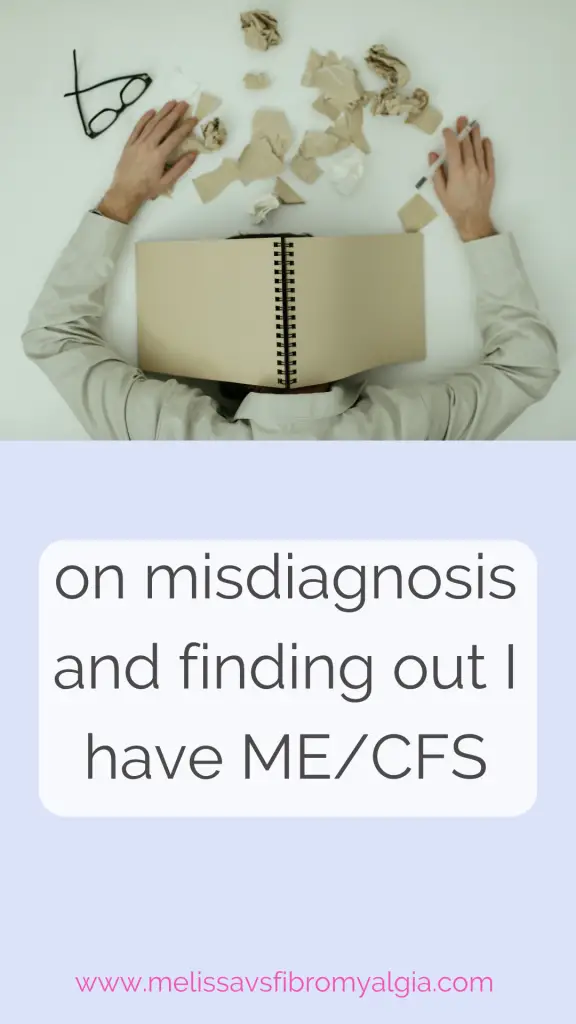My diagnostic process has been a tricky one. For many years we didn’t know what I had. When a friend sent me an article about fibromyalgia, it seemed to make sense. I took it to my doctor, she checked my tender points (already knowing my history) and said something along the lines of, “sure, it’s fibromyalgia”.

For the next 10 years I thought I had fibromyalgia. When in fact my diagnostic history shows “short-term” diagnosis entered every year as fibromyostitis.
Until 2014 when they put chronic fatigue syndrome as a long-term diagnosis. Fibromyostitis continued to make an appearance until 2019, when they put fibromyalgia as a long-term diagnosis.
Fast forward to 2023 when interstitial cystitis and endometriosis were added.
Until 2014 when they put chronic fatigue syndrome as a long-term diagnosis. Fibromyostitis continued to make an appearance until 2019, when they put fibromyalgia as a long-term diagnosis.
As someone who’s been dedicated to learning, trying and sharing how to manage fibromyalgia as well as possible – with a blog called Melissa vs Fibromyalgia – I’m sure how you can see this is a problem. I’ve also hesitated to use the term ME (myalgic encephalomyelitis) as it’s not in my diagnostic history (just CFS). But in a lot of literature, they go together as ME/CFS or CFS/ME.
Recently someone shared a non-profit organisation in Australia (over the pond from New Zealand) that has some wonderful resources. Their description of ME/CFS just fits everything I experience so well…
They list symptoms of ME/CFS
- Chronic fatigue
- Post-exertion malaise
- Sleep dysfunction
- Widespread pain in muscles or joints
- Cognitive difficulties, such as confusion, or problems with concentration or memory
- Sensitivity to noise or light
- Light-headedness or dizziness
- Difficulty with being upright
- Gastrointestinal problems such as nausea, abdominal pain, bloating and irritable bowel syndrome
- Flu-like symptoms
- Problems with temperature regulation
- Sensitivities to food, medications or chemicals
https://www.emerge.org.au/what-is-mecfs/

If this was a quiz, I’d get 100%. (The one quiz I don’t want full scores on!).
The disconnect is not only how I think of it myself but how I communicate it for myself. I noticed recently that I am terrible at explaining it quickly for people who ask me in real life.
The above article defines ME/CFS in this way, “Myalgic encephalomyelitis/chronic fatigue syndrome (ME/CFS) is a complex and disabling disease that affects many parts of the body, including the brain and muscles, as well as the digestive, immune and cardiac systems, among others. ME is classified as a neurological disorder by the World Health Organization.”
This is what I need to learn to paraphrase and share. It sounds so much better than whatever I mumble when put on the spot.
What now?
But also it’s time to start taking it a little more seriously. Because I’ve chipped away at everything else I can and these symptoms are still causing serious limitations.
In terms of personal protocol – everything I share stands. It’s time to work through why pacing is so important for me and how to finetune it better.
An example of how I ignore a very important symptom – post-exertion malaise – I always fail to factor in how long it may take to recover from something. On the Saturday before Christmas we had to fly to another city in New Zealand and back in one day. We had tried to schedule a flight the day before and stay overnight, but the flight was canceled. It took me three days to start to feel OK again. Unfortunately one of those days was Christmas. At four days post-exertion, I was still not at baseline. I am lucky enough to be well enough that it didn’t fully crash me, but the effects were destabilizing.
If I were smarter I would have postponed to the following weekend with the same plan of an overnight stay.
And if that’s how I must work around a one hour plane ride to a domestic destination. Imagine the rules I should have for overseas. Many destinations are simply out of reach right now, if I’m being smart.
It’s no fun. Of course I’d love to go anywhere, anytime and cope with it well. But I have the hand I was dealt and I need to play it the best I can. Because my quality of life absolutely counts.

The goals this year
At the base of many of my issues is nervous system dysregulation – caused by constantly being bombarded by messages from structural issues. We are slowing chipping away at these. So I want to get better at listening to my body while teasing apart the strands.
The chiropractor is helping me to work on the sacroiliac joint dysfunction and spine issues causing immense muscle pain.
I need to work through the orthostatic intolerance and create a good plan for managing this. Especially in the heat, I can’t avoid places hotter than 22 degrees forever.
There’s also no denying I need to read and reread the information about ME/CFS so that I can remember it. It’s a bit ridiculous that I advocate for others yet can’t explain myself well to people in my life.
What about you, what are you working on this year? What’s your experience with diagnoses?
